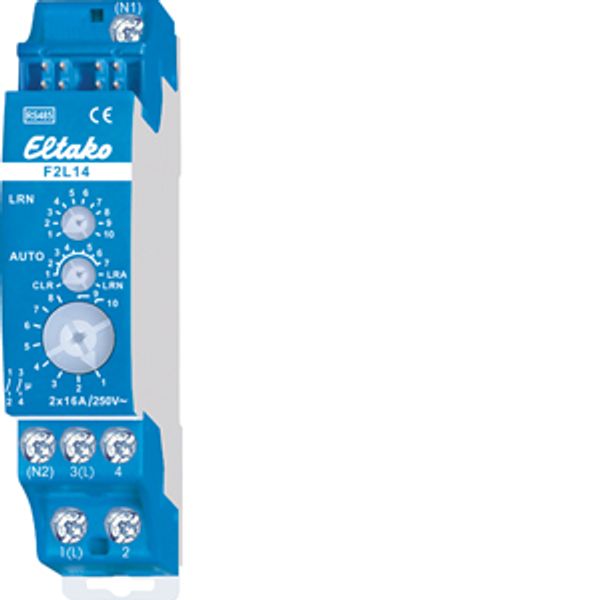Registreeru, et avada oma eksklusiivsed B2B hinnad ja alustada ostlemist. Registreeru kohe!
RS485 bus actuator 2-speed fan relay
Laos: Ei
Hankija laovaru: Ei
Minimaalne tellimuse kogus: 1
Hind (ilma KM-ta):
55,06 €
EAN: 4010312316160
MPN: 30014067
Pakend: 1
Technical Information
| Toote seisukord | Uus |
| Tootja nimi | RS485 bus actuator 2-speed fan relay |
| Bränd | ELTAKO |
| Kategooriad |
Lülitid
|
| Päritoluriik | CN |
| Harmoneeritud süsteemi kood | 8526 9200 00 |
| Paigaldusviis | Muul viisil |
| Värvus | Hall |
| Halogeenivaba | Yes |
| Pinnatöötlus | Muul viisil |
| Toide | Muul viisil |
| Releede arv | 2 |
| Sobib lülitamiseks | Yes |
| Sobib impulsslülitiks | Yes |
| Sobib hämardamiseks | No |
| Sobib rullsulguri lülitiks | No |
| Materjal | Termoplastist |
| Materjal | Plast |
| Kinnitusviis | Muul viisil |
| Muutuva koodisüsteemiga | - |
| Raadiosagedus | 868 MHz |
| Kestas | Yes |
| Torukujulises keres | No |
| Trükiplaat/moodul | No |
| Nupplülitusmoodus | Yes |
| Lülitusmoodus | Yes |
| Käsiraadiosaatja | No |
| Raadiosignaali kodeerimisseade | No |
| Raadiosignaaliga juhitava nupplülitiga | No |
| Sobib ribikardinate lülitiks | No |
| Sobib ribikardinate sulgemiseks | No |
| Läbipaistev | No |
| Pinna liik | Matt |
| Sobib vastava kaitseastme (IP) korral | IP20 |
| Saadaval on rakenduste IFTTT sobitustugi | No |
| Compatible with Apple HomeKit | No |
| Compatible with Google Assistant | No |
| Compatible with Amazon Alexa | No |
Pakendamise üksikasjad
| Pakkimistase 1 | 4010312316160, 4010312316160 |
| Pakkimistase 2 | 4010312316160 |
| Pakkimistase 3 | 4010312316160 |
Allalaadimised
Kirjeldus
2-speed fan relay, 1+1 NO contacts potential free 16A/250V AC, with DX technology. Bidirectional. Only 0.1 watt standby loss. Modular device for DIN-EN 60715 TH35 rail mounting. 1 module = 18mm wide, 58mm deep. Connection to the Eltako-RS485 bus. Bus cross wiring and power supply with jumper. Patented Eltako Duplex technology allows you to switch normally potential free contacts in zero passage switching when 230V A/C voltage 50Hz is switched. This drastically reduces wear. To achieve this, simply connect the N conductor to the terminal (N1) and L to 1(L) and/or N to (N2) and L to 3(L). This results in an additional standby consumption of only 0.1 watt. If supply voltage fails, the switching state is retained. When supply voltage is restored, the device is switched off in defined mode. This fan relay evaluates the information of up to 23 passive sensors, e.g. wireless pushbuttons, window/door contacts, window handle sensors FFG7B-rw or wireless transmitter modules. Active sensors for CO2, air quality, humidity and temperature are also evaluated. Several active sensors can be linked by the PCT14 PC Tool. When the two contacts are switched in parallel, the 2-speed actuator for 2 fan speeds becomes an actuator for one fan. The middle rotary switch must be set to position LRN for teach-in. Set the required operating mode when the fan actuator is in operation. During the teach-in process, adjust the upper rotary switch to set the sensor type. A wireless pushbutton (exclusive) with double rocker is taught-in in rotary switch position 1. Double rockers are assigned automatically: top left Stage 1 (only contact 1-2 closed), top right stage 2 (only contact 3-4 closed). Bottom left and bottom right OFF: both contacts open. A wireless pushbutton (adding) with double rocker is taught-in in rotary switch position 2. Double rockers are assigned automatically: top left stage 1 (contact 1-2 closed), top right Stage 2 (contacts 1-2 and 3-4 closed). Bottom left and bottom right OFF: both contacts open. If you switch the two contacts in parallel, one wireless pushbutton and 1 rocker are sufficient. In this case, top is ON and bottom is OFF. In rotary switch position 3, teach in ON/OFF switch with double rocker (all rockers are assigned automatically) and wireless transmitter modules When you teach in an FTK device, window handle sensor FFG7B-rw or active sensor, there is no need to take the teach-in position into account. When operated with an active sensor, set the switch-in threshold on the lower rotary switch. When the threshold is reached, Stage 1 (Contact 1-2) is switched on. At the upper rotary switch, set the addition value at which Stage 2 (Contact 3-4). Turn the middle rotary switch to set one of the operating modes AUTO1 to AUTO7. AUTO1: for manual mode of a 2-stage fan by means of a double rocker wireless pushbutton. Each contact is closed separately (exclusive) or contact 3-4 cuts in to switch stage 2 (accumulative). This is determined when teaching-in. Passive sensors, such as wireless pushbuttons and transmitter modules, which are taught-in as a off-switches, cause opening of both contacts. As long as the control voltage is applied to transmitter modules or a window monitored by an FTK or window handle sensor FFG7B-rw is open, the contacts are open and can not be switched on manually. AUTO2: Activating with either a wireless CO2 or air quality sensor. The switch-on thresholds are set by the lower and upper rotary switches. The contacts close exclusively. AUTO3: Activating with wireless CO2 sensor. The switch-on thresholds are set by the lower and upper rotary switches. The contacts close exclusively. AUTO4: Same as AUTO2, but activated by the wireless temperature sensor. AUTO5: Same as AUTO2, but the contacts close adding. AUTO6: Same as AUTO3, but the contacts close adding. AUTO7: Same as AUTO4, but the contacts close adding. Overview of switch-on thresholds for CO2, air quality, humidity and temperature see operating instructions. The LED below the upper function rotary switch performs during the teach-in process according to the operating instructions. It shows control commands by short flickering during operation.

